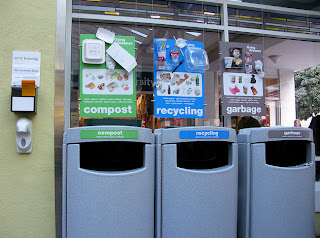This is not the trash bins that were at the zoo, although very similar. In fact, the bins at the zoo had compost (including pictures of what could and could not go in there), recycling (including the different recycling numbers), trash, and a few others. They were very descriptive and easy to see what was supposed to go where. They were even designed just for the zoo, so the pictures were zoo concessionaire specific products.
What I saw absolutely appalled me. First were children, approximately 12 years of age, coming up and throwing their recycling into the compost bin. Then came adults who were throwing their food waste into the recycling. The big kicker at the end was the teenager who came up and did her best to divide up her items, but her dad came up behind her and put everything (yes, including the non-disposable serving tray) into the recycling bin. We are living in an age of stupidity or total apathy where people just don't care. As long as it's not in their hands anymore, they don't care where their waste ends up. It would take approximately an extra 20 seconds out of your time (maximum!!) to correctly divide up your waste.
Not only this, but as soon as we go out of the car in the parking lot I saw a woman just throw her trash on the ground and walk away. I almost picked it up and threw it back on her. It's laziness, stupidity, and an utter lack of responsibility.
In an day and age where we are constantly engrossed in the latest social media, YouTube videos, news, drama, and more, we are moving at an ever faster pace that has caused us to lose touch with the world around us and think about the life-cycle of where our products end up. Those plastic bottles in the composting bin do not decompose, but will only destroy the newly created soil and contaminate the plants that will use this product. It may not seem like compost items in the trash is a big deal, as it will end up in the landfill, but it is contributing to an ever growing epidemic of landfills across our nation. We have the opportunity to create a change in our nation and our world by being able to slow down. This encompasses not only where our food comes from (Slow Food International) but also where it will eventually end up. Waste is piling up on our roadways, in our parks, throughout our waterways and oceans, and in our atmosphere. Just because you may not see the biproduct of burning fossil fuels (although I am a proponent of natural gas drilling) does not mean it isn't waste. I am urging anyone who reads this to take a moment to think about the life-cycle of our food system.
I highly recommend reading Michael Pollan's The Omnivore's Dilemma, a wonderful book that describes the state of the food system in the United States. Other popular documentaries include:
I present these titles not as a means to go vegan or vegetarian, but as a way to show you that we need to be aware of the life-cycle of our choices. Where do the parts and materials that make up our cars and our computers come from and where do they go when we are done with them? Where do those plastic six-pack holders come from and where do they go (Yes, I cut mine even if I recycle them in case they end up somewhere they shouldn't so they don't hurt animals)?
It's a matter of being smart, slowing down, and stepping back to read the signs that point us to where to put our waste and also strive to educate us. If it's a food item, it can be composted. If it's plastic or metal, it can almost always be recycled. Pretty much everything we use can be recycled in some way, if you're willing to turn over the can or plastic bottle look where it goes. When you turn over a bottle, you'll most likely see something like the images below or some variation that will point you in the right direction:
Now, today's idiots didn't even need to look on the bottom as it was recycling numbers 1-7 in the same bin...they were just lazy and irresponsible. I took it as a lesson to educate my girlfriend's niece on where our trash goes and why. Hopefully we can begin a societal shift where our next generation will have a care for the natural world around them and the ability to think clearly and concisely, slow down, and realize the impacts their simple choices may have.


No comments:
Post a Comment